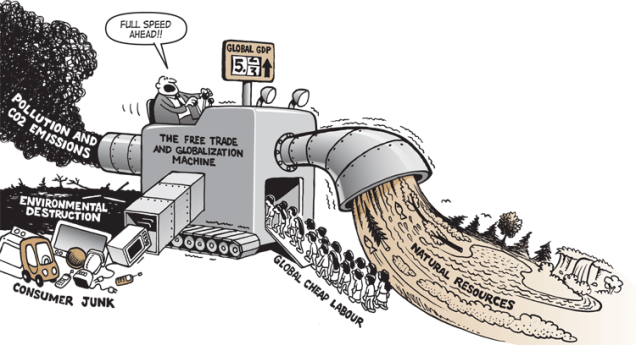During the globalization wars of the late nineties and early 2000s, I used to follow international trade law extremely closely. But I admit that as I immersed myself in the science and politics of climate change, I stopped paying attention to trade. I told myself that there was only so much abstract, bureaucratic jargon one person could be expected to absorb, and my quota was filled up with emission mitigation targets, feed-in tariffs, and the United Nations’ alphabet soup of UNFCCCs and IPCCs. Then about three years ago, I started to notice that green energy programs – the strong ones that are needed to lower global emissions fast – were increasingly being challenged under international trade agreements, particularly the World Trade Organization’s rules.In 2010, for instance, the United States challenged one of China’s wind power subsidy programs on the grounds that it contained supports for local industry that were considered protectionist. China, in turn, threatened to bring a dispute against renewables subsidies in five U.S. states.
Fonte: The Globeandmail

Unfortunately, there has always been a antagonistic relation between free trade and environmental responsibility. The game theory rationality of the market begets free trade to thrive; that creates an environment of superficial fairness akin to the first wave of human rights, in that most regulation is negative and protective of an individuality as it were. E.g. principle of the Most Favored Nation and authorization compensatory measures. There is understandably a resistance to changes in those regards, for even if you operate in a hyperrational game theory, as long as the other participants remain rational your only choice is to be rational. It’s only through a true consensus of all parties that game theory rationality can be safely surpassed in favor of a rationality of what’s best for the individual and the group, not just the individual.
CurtirCurtir
In the past trade and environment policies were considered totally opposite things, that could not be conciliated. But this have been changing. Lately, people are starting to realize that it is possible to conciliate trade, sustainable development and environmental policies, inclusively that trade can be helpful to avoid the climate changes that aren’t natural and that the more trade doesn’t necessarily means more harmful to the nature. It is becoming known that international trade policies and climate change measures connect in many ways. According to the Trade and Climate Change WTO-UNEP Report, published in 2009, there is a “link between sustainable development and trade opening in order to ensure that market opening goes hand in hand with environmental and social objectives”. So, trade can help the climate changes lowing barriers to the goods and services that are environmental friendly and imposing barriers to the products that aren’t. This context is shown in Naomi Klein testimony that gives the example that green energy programs is been encouraged with trade nowadays.
CurtirCurtir
After the industrial revolution, the global warming became a very important issue to the whole world, however people did not have scientific prove about what was happen, and they stayed many years without doing nothing. Nowadays companies and the environment policies have to walk side-by-side developing new kinds of green technology; we know the resources are limited and we have to recycle and take care of every think we take out of the environment. There is many kinds of quality and environment protection such as ISO 9001 (International Organization Standardization) and ISO 14000 that regulates the environment and companies relationship. Today is unacceptable a company that works out of the environment regulations, also consumers are starting to decline products that does not have the green label.
CurtirCurtir
Despite believing that climate problems that we perceive today are the result of outrageous and thoughtless consumption, I do not think the price of free trade is unchecked climate change, because if the industry took into account the environmental impact of production and measures were taken to soften it, the free trade would not be such a problem.
CurtirCurtir
Nowadays, the environment policies are not one of the biggest concern of the countries. But I think that today countries, mainly the development ones, are begining to concern about that. We see a lot of companies that encourage the reduction of pollution, motivate reformation reforestation and recycling. These companies are called “green companies”. The international organizations, such as United Nations, have to concern more about the nature and climate change. They should create some rules to regulate this subject. Moreover create some methods to enforce countries, such as China, to obey the international programs that regulate environment.
CurtirCurtir